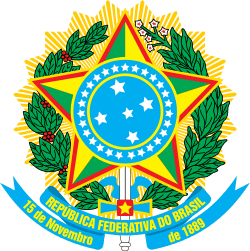Constitution of Brazil
| Constitution of the Federative Republic of Brazil | |
|---|---|
 The original copy of the Constitution | |
| Created | October 5, 1988 |
| Author(s) | 1987–1988 Constituent Assembly |
| Signatories | Constituent Assembly |
| Purpose | National constitution |
 |
| This article is part of a series on the politics and government of Brazil |
|
| Foreign relations |
The Constitution of the Federative Republic of Brazil (Portuguese: Constituição da República Federativa do Brasil) is the supreme law of Brazil. It is the foundation and source of the legal authority underlying the existence of Brazil and the federal government of Brazil. It provides the framework for the organization of the Brazilian government and for the relationship of the federal government to the states, to citizens, and to all people within Brazil.
Overview
The current Brazilian Constitution is the seventh enacted since the country's independence in 1822, and the sixth since the proclamation of the republic in 1889. It was promulgated on October 5, 1988 after a two-year process in which it was written from scratch.
History
The current Constitution of Brazil was drafted as a reaction to the period of military dictatorship, and sought to guarantee individual rights and restrict the state's ability to limit freedom, to punish offences and to regulate individual life. Among the new constitutional guarantees are the errand of injunction and the habeas data. It also anticipated the existence of a Consumers' Defence Code (enacted in 1990), of a Children's and Youth Code (1990) and of a new Civil Code (2002).
It was the first constitution to demand severe punishment for breaches of civil liberties and rights. Consequently, Brazil later approved a law making the propagation of prejudice against any minority or ethnic group an unbailable crime. This law provided legal remedy against those who spread hate speech or those who do not treat all citizens equally. This second aspect helped disabled people to have a reserved percentage of jobs in the public service and large companies, and Afro-Brazilians to seek reparation for racism in court.
Breaking with the authoritarian logic of the previous Constitution, it made unbailable crimes those of torture and of actions directed against the democratic state and the constitutional order, thus creating constitutional devices to block coups d'état of any kind.
The Constitution also established many forms of direct popular participation besides regular voting, such as plebiscite, referendum and the possibility of ordinary citizens proposing new laws. Examples of these democratic mechanisms were the 1993 plebiscite concerning the form of government, where the presidential system was confirmed, and the 2005 referendum concerning the prohibition of the sale of firearms and ammunition.
The mention of God in the preamble of the Constitution (and later on the Brazilian currency) was opposed by most leftists as incompatible with freedom of religion because it does not recognise the rights of polytheists (like the Amerindians) or atheists. The Supreme Federal Court has ruled that this omission of the protection of God was not unconstitutional since the preamble of the constitution is simply an indication of principles that serves as an introduction to the constitutional text and reflects the ideological conceptions of the legislator, falling within the scope of political ideology and not of the Law.
Preamble
The preamble to the Federal Constitution is a brief introductory statement that sets out the guiding purpose and principles of the document. The text reads:[1]
| “ | We, the representatives of the Brazilian People, assembled in the National Constituent Assembly to institute a Democratic State for the purpose of ensuring the exercise of social and individual rights, liberty, security, well being, development, equality and justice as supreme values of a fraternal, pluralist and unprejudiced society, based on social harmony and committed, in the internal and international spheres, to the peaceful solution of disputes, promulgate, under the protection of God, this Constitution of the Federative Republic of Brazil. | ” |
Title 1
[2] Title 1 is devoted to the fundamental principles of the Republic.
This section comprises the base of the Republic, stating the States, the cities and the Federal District as the indissoluble constituents of the Union. It also establishes three independent, harmonic branches (Executive, Legislative and Judiciary) and lists the nations's main goals.
One of the most important excerpts from this title is in Article 1, single paragraph, stating:
| “ | All power emanates from the People, who exercise it through elected representatives or directly, under this Constitution. | ” |
Title 2
Title 2 states the Fundamental Safeguards.[3]
This chapter ensures basic rights to all citizens and aliens, prohibits capital punishment, defines citizenship requirements, political rights, among other regulations.
Title 3
Title 3 regulates the State Organization.
This title establishes Brasília as the Nation's capital, the rights and duties for the Union, the States and the Cities, as well rules for the public staff.
Title 4
Title 4 disposes about the branches of government.
This chapter describes the attributes for every government branch, and the rules for Amendment to the Constitution as well.
Title 5
Title 5 regulates the Defense of the State and its Democratic Institutions.
This title rules the deployment of the armed forces, the national security baselines, and declaration of state of siege.
Title 6
Title 6 comprises the Taxation and the nation's Budget.
Such title disposes on tax distribution among the Union components and their competencies, and the Nation's budget.
Title 7
Title 7 dictates on the economic and financial order.
Title 7 rules the economic activities in the country, the agricultural and urban policies, as well the state monopolies.
- The constitution requires the Brazilian government to "expropriate for the purpose of agrarian reform, rural property that is not performing its social function." (Article 184)
- According to Article 186 of the constitution, the social function is performed when rural property simultaneously meets the following requirements: Rational and adequate use. Adequate use of available natural resources and preservation of the environment. Compliance with the provisions which regulate labor relations. Exploitation which favors the well-being of the owners and workers.
Title 8
Title 8 disposes about the social order.
This title establishes the Social Security system, Public Health system, Public Pension system, among regulations concerning education, culture, science and technology, and sports policies.
Title 9
Title 9 encompasses general constitutional dispositions.
Among those, there are sparse regulations, as well as transitional dispositions.
References
- ↑ Brazil - Constitution:Preamble International Constitutional Law. Retrieved on 2011-10-13.
- ↑
- ↑ "Brazil 1988 (rev. 2014)". Constitute. Retrieved 9 April 2015.
External links
| Wikimedia Commons has media related to Constitutions of Brazil. |
- (full text) Constituição da República Federativa do Brasil (Portuguese)
- (full text - English translation by the Chamber of Deputies) Constitution of Brazil (English)
.svg.png)